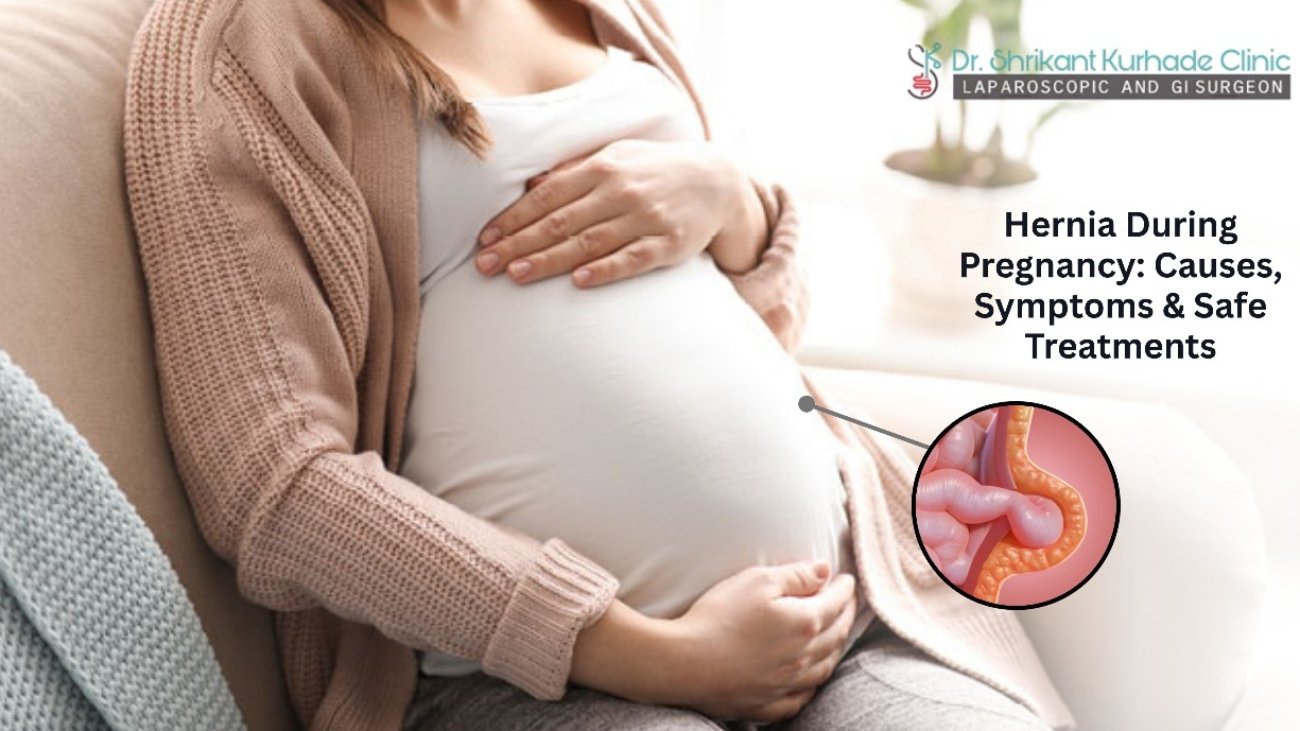A woman’s body undergoes numerous changes during pregnancy, some of which are anticipated and some of which are unexpected. Pregnancy-related hernia development or worsening is one such unforeseen problem. Although they are not very common, hernias can worry expectant mothers, particularly when it comes to their unborn child’s safety and the available treatment options.
We at KK Care Clinic are aware of the physical and psychological toll that a pregnancy hernia can take. To help you feel knowledgeable and in control of your pregnancy journey, this blog provides information on Hernia During Pregnancy & its causes, symptoms, and safe treatments.
What Is a Hernia?
When an internal organ or tissue pushes through a weak area in the surrounding muscle or connective tissue, it can cause a hernia. The expanding uterus during pregnancy puts additional strain on the abdominal wall, which may result in a hernia or exacerbate an existing one.
Although there are several kinds of hernias, the following are the most typical ones that occur during pregnancy:
- umbilical hernia: An umbilical hernia during pregnancy appears as a soft or firm bulge around the belly button when abdominal tissues or organs push through a weakened area near the navel.
- Inguinal hernia: The groin area is where an inguinal hernia appears.
- Incisional hernia: An incisional hernia may develop at the location of a prior surgical scar, such as from an appendectomy or C-section.
What Causes of Hernia During Pregnancy
- Pregnancy-related hernias can develop for a number of reasons, including:
- Increased abdominal pressure: The abdominal wall is compressed by the growing uterus.
- Hormonal changes: Relaxing and other pregnancy hormones cause the connective tissues to relax, which raises the risk of herniation.
- Hernia risk may be increased by surgical scars or weak spots from prior abdominal surgeries.
- Multiple pregnancies: Women who have had multiple pregnancies may feel more pressure on their abdominal wall.
- Excessive weight gain: Putting too much weight on the abdomen or gaining weight quickly can put more strain on it.
- Constant coughing or constipation: Over time, repetitive strain can erode the abdominal wall.
Symptoms of Hernia During Pregnancy
While many hernias during pregnancy are discovered during routine prenatal checkups and are asymptomatic, pregnancy hernia symptoms can manifest when the hernia becomes more noticeable or bothersome—typically in the following ways:
- An obvious protuberance in the groin or abdomen
- Pain or discomfort, particularly when lifting, coughing, or standing
- A sensation of weight or pressure in the abdomen
- Vomiting or nausea (rarely severe cases, such as strangulated hernias)
- Tenderness or redness surrounding the bulge
If any of these symptoms occur, it’s critical to see a doctor, particularly if the hernia hurts or the bulge doesn’t go away when you lie down.
Is Hernia Dangerous During Pregnancy?
Most pregnancy hernias are benign and can be managed effectively with supportive care and careful monitoring. Laparoscopic hernia surgery is rarely required during pregnancy—most cases resolve without complications, and hernia surgery after pregnancy is typically scheduled postpartum or alongside a C‑section if needed.
To guarantee the safety of both mother and child, prompt diagnosis and observation by a trained gynecologist or surgeon are crucial.
Diagnosis of Hernia During Pregnancy
A physical examination is usually sufficient to diagnose a suspected hernia. To determine the extent and severity of the hernia, ultrasound imaging may be advised in certain situations. In order to minimize the risk to the infant during evaluation, our team at KK Care Clinic uses safe, non-invasive diagnostic tools.
Safe Treatment Options During Pregnancy
Treatment for a hernia during pregnancy depends on the type, severity, and presence of symptoms. Here are the options available:
1. Vigilant Awaiting
Doctors typically advise postponing surgery until after delivery if the hernia is minor and not causing any discomfort. Keeping an eye on the hernia during pregnancy guarantees that any changes can be treated right away.
2. Changes in Lifestyle
- Steer clear of heavy lifting.
- Keep your posture in check.
- Control your weight gain
- Use a high-fiber diet to relieve constipation.
- If your doctor recommends it, wear maternity belts or binders.
These adjustments can help reduce symptoms and prevent the hernia from worsening.
3. Surgery (Only When Required)
Most pregnancy hernias are harmless and effectively managed with supportive care and careful monitoring. Robotic Hernia Surgery is rarely required during pregnancy—most cases resolve without complications, with hernia surgery after pregnancy typically scheduled postpartum or alongside a C-section if needed.
Why Choose KK Care Clinic?
For expectant mothers with hernias, we at KK Care Clinic in Charholi, Pimpri Chinchwad, provide compassionate, expert care. In close collaboration with gynecologists, renowned and skilled surgeon Dr. Shrikant Kurhade—the trusted Hernia-specialist in Pimpri Chinchwad—ensures safe monitoring, prompt intervention, and condition-specific postpartum treatment options tailored to each mother’s needs.
Conclusion
Pregnancy-related hernias may seem concerning, but they can be safely managed with prompt diagnosis and appropriate care. Most cases of hernia pain during pregnancy are mild and resolve postpartum, and hernia surgery after pregnancy is seldom needed during gestation. The majority of cases can wait until after delivery and don’t require surgery while pregnant. If you have concerns or suspect a hernia, don’t hesitate to seek trustworthy guidance from the professionals Robotic Surgeon in Pune at KK Care Clinic.

